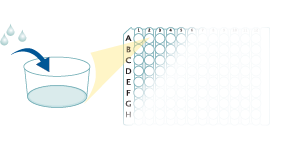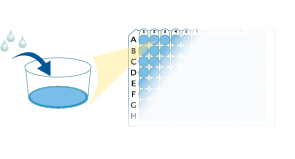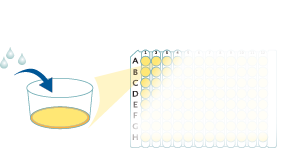Mouse Tie-2 ELISA Kit - Quantikine
Mouse Tie-2 Quantikine ELISA Kit Summary
Product Summary
Precision
Cell Culture Supernates, Tissue Homogenates, Serum, EDTA Plasma, Heparin Plasma
| Intra-Assay Precision | Inter-Assay Precision | |||||
|---|---|---|---|---|---|---|
| Sample | 1 | 2 | 3 | 1 | 2 | 3 |
| n | 20 | 20 | 20 | 21 | 21 | 21 |
| Mean (pg/mL) | 395 | 1149 | 3470 | 434 | 1187 | 3183 |
| Standard Deviation | 26.1 | 69.1 | 220 | 34.5 | 77.6 | 147 |
| CV% | 6.6 | 6 | 6.3 | 7.9 | 6.5 | 4.6 |
Recovery
The recovery of mouse Tie-2 spiked to three levels throughout the range of the assay in various matrices was evaluated.
| Sample Type | Average % Recovery | Range % |
|---|---|---|
| Cell Culture Supernates (n=4) | 106 | 98-119 |
| EDTA Plasma (n=5) | 107 | 95-120 |
| Heparin Plasma (n=4) | 102 | 87-113 |
| Serum (n=4) | 103 | 93-116 |
Linearity
Scientific Data
Product Datasheets
Preparation and Storage
Background: Tie-2
Tie-2, also known as Tek, is a transmembrane receptor tyrosine kinase (RTK) that functions as a receptor for Angiopoietin family proteins. It is expressed by embryonic and adult endothelial cells, hematopoietic stem cells, and a circulating population of proangiogenic monocytes. Tie-2 signaling is activated by Angiopoietins-1 and -4, while it can be either activated or inhibited by Angiopoietins-2 and -3. Tie-2 plays an important role in maintaining vascular integrity by mediating endothelial cell-smooth muscle cell communication and inhibiting endothelial cell apoptosis. It is also required for embryonic development of the endocardium. In addition, Tie-2 signaling mediates the quiescence of bone marrow stem cells in response to osteoblast-produced Angiopoietin-1. This quiescence is critical for maintaining an ongoing hematopoietic capability in the bone marrow.
Assay Procedure
Refer to the product- Prepare all reagents, standard dilutions, and samples as directed in the product insert.
- Remove excess microplate strips from the plate frame, return them to the foil pouch containing the desiccant pack, and reseal.
- Add 50 µL of Assay Diluent to each well.
- Add 50 µL of Standard, Control, or sample to each well. Cover with a plate sealer, and incubate at room temperature for 2 hours on a horizontal orbital microplate shaker.
- Aspirate each well and wash, repeating the process 4 times for a total of 5 washes.
- Add 100 µL of Conjugate to each well. Cover with a new plate sealer, and incubate at room temperature for 2 hours on the shaker.
- Aspirate and wash 5 times.
- Add 100 µL Substrate Solution to each well. Incubate at room temperature for 30 minutes on the benchtop. PROTECT FROM LIGHT.
- Add 100 µL of Stop Solution to each well. Read at 450 nm within 30 minutes. Set wavelength correction to 540 nm or 570 nm.





Citations for Mouse Tie-2 Quantikine ELISA Kit
R&D Systems personnel manually curate a database that contains references using R&D Systems products. The data collected includes not only links to publications in PubMed, but also provides information about sample types, species, and experimental conditions.
8
Citations: Showing 1 - 8
Filter your results:
Filter by:
-
Female sex protects against renal edema, but not lung edema, in mice with partial deletion of the endothelial barrier regulator Tie2 compared to male sex
Authors: van Leeuwen, ALI;Beijer, E;Ibelings, R;Dekker, NAM;van der Steen, MRA;Roelofs, JJTH;van Meurs, M;Molema, G;van den Brom, CE;
PloS one
Species: Mouse
Sample Types: Plasma
-
Characterization of the Ang/Tie2 Signaling Pathway in the Diaphragm Muscle of DMD Mice
Authors: Lin, Y;McClennan, A;Hoffman, L;
Biomedicines
Species: Mouse
Sample Types: Tissue Homogenates
-
Pattern of tamoxifen-induced Tie2 deletion in endothelial cells in mature blood vessels using endo SCL-Cre-ERT transgenic mice
Authors: PJ Zwiers, RM Jongman, T Kuiper, J Moser, RV Stan, JR Göthert, M van Meurs, ER Popa, G Molema
PLoS ONE, 2022-06-08;17(6):e0268986.
Species: Mouse
Sample Types: Tissue Homogenates
-
Concentrated Secretome of Adipose Stromal Cells Limits Influenza A Virus-Induced Lung Injury in Mice
Authors: NV Bogatcheva, ME Coleman
Cells, 2021-03-24;10(4):.
Species: Mouse
Sample Types: Tissue Homogenates
-
Vasculotide reduces pulmonary hyperpermeability in experimental pneumococcal pneumonia
Authors: B Gutbier, X Jiang, K Dietert, C Ehrler, J Lienau, P Van Slyke, H Kim, VC Hoang, JT Maynes, DJ Dumont, AD Gruber, N Weissmann, TJ Mitchell, N Suttorp, M Witzenrath
Crit Care, 2017-11-13;21(1):274.
Species: Mouse
Sample Types: Cell Lysates
-
Acute administration of recombinant Angiopoietin-1 ameliorates multiple-organ dysfunction syndrome and improves survival in murine sepsis.
Authors: David S, Park JK, Meurs M, Zijlstra JG, Koenecke C, Schrimpf C, Shushakova N, Gueler F, Haller H, Kumpers P
Cytokine, 2011-04-30;55(2):251-9.
Species: Mouse
Sample Types: Tissue Homogenates
-
Multiple circulating proangiogenic factors induced by sunitinib malate are tumor-independent and correlate with antitumor efficacy.
Authors: Ebos JM, Lee CR, Christensen JG, Mutsaers AJ, Kerbel RS
Proc. Natl. Acad. Sci. U.S.A., 2007-10-17;104(43):17069-74.
Species: Mouse
Sample Types: Plasma
-
A novel siRNA-lipoplex technology for RNA interference in the mouse vascular endothelium.
Authors: Santel A, Aleku M, Keil O, Endruschat J, Esche V, Fisch G, Dames S, Loffler K, Fechtner M, Arnold W, Giese K, Klippel A, Kaufmann J
Gene Ther., 2006-04-20;13(16):1222-34.
Species: Mouse
Sample Types: Serum
FAQs
No product specific FAQs exist for this product, however you may
View all ELISA FAQsReviews for Mouse Tie-2 Quantikine ELISA Kit
There are currently no reviews for this product. Be the first to review Mouse Tie-2 Quantikine ELISA Kit and earn rewards!
Have you used Mouse Tie-2 Quantikine ELISA Kit?
Submit a review and receive an Amazon gift card.
$25/€18/£15/$25CAN/¥75 Yuan/¥2500 Yen for a review with an image
$10/€7/£6/$10 CAD/¥70 Yuan/¥1110 Yen for a review without an image






